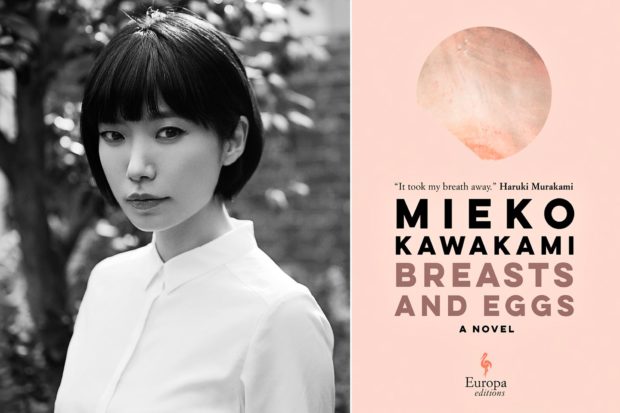You have no items in your cart. Want to get some nice things?
Go shopping
Although a translation of her short novel Ms Ice Sandwich was brought out by Pushkin Press in 2017, Breasts and Eggs is the full-length fiction by Mieko Kawakami to appear in English.
The initial part, originally published as a novella in 2008, is a first-person narrative about a few days in the life of 30 year old Natsuko. She’s moved to Tokyo from Osaka and dreams of artistic success while living on the breadline. Her big sister Makiko, who brought her up, is visiting. Makiko works in a hostess club and has come to the capital to finalise her cherished plan to get breast implants. Makiko is accompanied by her 12 year old daughter Midoriko, who has retreated into silence, confiding only in her journal.
Midoriko’s diary, which punctuates the narrative, is the highlight of Part One. She is a female Adrian Mole, a working class kid, struggling to make sense of a dysfunctional adult world. But while Sue Townsend’s take on the world is gently humorous, Kawakami dishes up stronger fare. Adrian’s changing body causes him mild embarrassment, but Midoriko feels horror about impending puberty. She is equally disgusted by her mother’s determination to have surgery. (A girl may face truths that women do their utmost to repress.)
Breast and Eggs is a book of two, unbalanced, halves. In the much longer second part Natsuko is keeping afloat as a freelance writer – albeit one with a bad case of novelist’s block. The baton of angst, previously borne by sister and niece, has been passed to her. Natsuko is consumed by the wish to have a child. Because sexual desire was absent in her one long-ago relationship, she has concluded sperm donation is the answer.
The theme of insemination has the potential for comedy gold. And this is delivered in the scene where Natsuko meets Onda, a potential donor whose prolixity equals that of Austen’s Mr Collins. But while Midoriko’s fears of womanhood, Makiko’s dreams of a perfect bosom, are served with liberal doses of authorial irony, satire is off the menu when it comes to Kawakami’s chief protagonist.
The narrator’s alternating decision and indecision – her exchanges with equally unhappy friends – would entertain as lifestyle journalism pieces or entries to a blog. But when joined up as chapters in a novel, they have their longueurs.
At times Breasts and Eggs is reminiscent of a Buy-One-Get-One-Free supermarket offer. Part One is the brilliant debut novel and Part Two the ‘difficult’ successor. This unevenness may arise because Kawakami doesn’t feel bound to fulfil our expectations of what a novelist ‘should’ do. She may be seen as a latter day DH Lawrence. Brilliantly poetic and powerful at some points – at others repetitive and didactic. And, like Lawrence in his time, Kawakami has attracted both censure and adulation.
Happily the first DH is at the helm as the novel draws towards its close. The chapters in which Natsuko returns to visit her childhood home., when she has her baby, are extraordinary.
Here Kawakami makes a significant addition to the feminist line of alternative birth narratives begun by Mary Shelley. Natsuko also takes her place in a parade of heroines – Jane Eyre, Jeanette in Oranges Are Not the Only Fruit – who exult in their own happy ending.
The labour of reading Breasts and Eggs becomes wholly worthwhile.
Breasts and Eggs is published by Europa Editions.

About Sibyl Ruth
Sibyl Ruth is a poet and short fiction writer who lives in Birmingham, UK. A former winner of the Mslexia Poetry competition ,her most recent publications have appeared in 'The Book of Birmingham' (Comma Press, 2018 and 'Who are we now? A collection of true stories about Brexit' (Tangled Roots, 2019).


